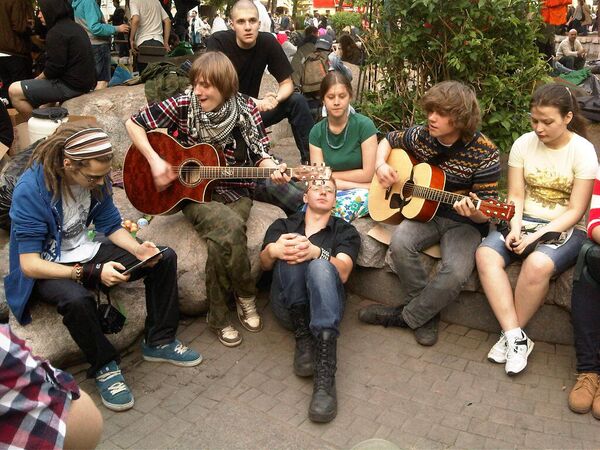The political rift between the opposition-minded middle class in Moscow and the population in the Russian provinces is a myth, with most of the populace united in the demand for change, a group of experts established by former Finance Minister Alexei Kudrin said on Thursday.
But the government is ill-suited to implement broad institutional reforms expected by the people, which makes chaotic and sudden fall of the current regime likely in a couple of years, the experts said at a press conference in Moscow.
“We can avoid it if modernization-minded people in power and from among the protesters begin dialogue,” said Mikhail Dmitriyev, the head of the Center for Strategic Research think-tank.
“But it is unlikely, and we’re already sliding into the sinkhole of political confrontation,” he said at a press conference on Thursday.
The Civil Initiatives Committee, which is headed by Kudrin, commissioned a study of the ongoing political crisis in the country to Center for Strategic Research, which has successfully predicted in 2011 the mass anti-Kremlin protests in Moscow that started after the parliamentary elections in December and are still ongoing.
The sweeping report, based on 60 focus groups across the country and numerous interviews with protesters, has shattered many preconceptions about the state of mind of the Russian public, Dmitriyev said.
United Nation
“Most of the nation has convergent demands, which shows the maturity of our voters,” Dmitriyev said.
Protests in Moscow were driven by middle-class urbanites, and President Vladimir Putin, who won the vote in March, played them down by painting their participants in his campaign as arrogant hipsters while appealing to poorer residents in the regions, where dislike of the capital is traditionally high.
But in fact, most of the populace, including both the middle class and the working class, wants reform of the country’s main institutions, including healthcare, education, communal utilities and law enforcement, all of which are ineffective, the study showed.
The sole exception are actual rally goers in Moscow who campaigned for political reform, not institutional modernization, which puts them out of touch with the populace at large, Dmitriyev said, presenting the findings.
But though active protesters number no more than an estimate 150,000, they will continue to have a massive impact on the situation in the country due to being the sole public manifestation of the political crisis, he said.
Professionals Over Populists
The current public is also immune to populism, including nationalism, instead looking for public figures with a track record of real achievements, the study said.
The threat of ultranationalists coming to power through fair voting was often cited by the Kremlin in recent years as the reason for interfering with the political playing field, denying opposition politicians participation in various elections.
Regional leaders have the power to catapult into national spotlight over very short time provided they have some practical accomplishments to present to voters, Dmitriyev said.
The Kudrin Party
Kudrin himself was considered a political hopeful ever since then-President Dmitry Medvedev ousted him last September after a public spat following 11 years at the job.
A skilled professional credited with sparing Russia from the worst consequences of the recent global recession, Kudrin retained many friends in high places while commanding respect in opposition circles, and attempted to mediate between the two when the protests began in December, though the dialogue fizzled out after several meetings between the sides.
Kudrin was also tipped to create his own political party, likely right-of-center – an option that he said on Thursday is still on the cards.
“We’ve begun a discussion about it at a meeting of our committee yesterday…but the discussion is expected to take several months,” he said.
Reaction, Stagnation, Modernization and Chaos
There are four scenarios to the political crisis in the country, including political reaction, modernization through dialogue between the government and the opposition, chaotic radical transformation of power and inertial development bordering on stagnation, the study said.
Main factors to define the future course of events will be the ability of the moderates in the government and the opposition to enter a dialogue, as well as the prospect of a new global recession triggered by Greece’s ailing economy, which is likely to reflect on Russia, worsening the economic situation and fueling discontent, experts said.
“Urgent modernization is possible through peaceful dialogue and…open discussion in various forms, including rallies, and constant nagging of the authorities with demands for change,” Kudrin said. But Dmitriyev said the most likely scenario is mounting pressure on protests eventually resulting in public backlash and sudden transformation of power. He denied the possibility of a full-scale armed standoff, predicting instead a sweeping wave of street protests like those ongoing in Greece that would cripple the government.
When asked by RIA Novosti, Kudrin listed out several ways of facilitating possible dialogue between protesters and the authorities, including roundtables and meetings between Kremlin spokespeople and most trusted opposition representatives, possibly selected through online voting.
“Some of it has been attempted before…but the main dialogue hasn’t started yet,” he said.
Putin is very reluctant to enter open dialogue, but the growing realization of political crisis might force him into it, said political analyst Dmitry Oreshkin, a member of Kudrin's committee.
“But I have to definite answer for how to bring that about,” Oreshkin said at the sidelines of the conference. “The protest must continue to mount, find new forms and spread to the regions.”

